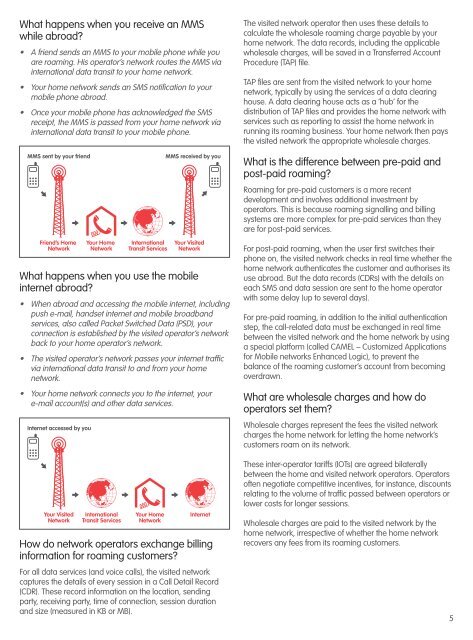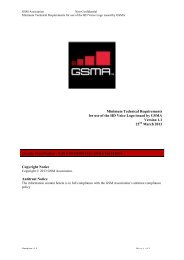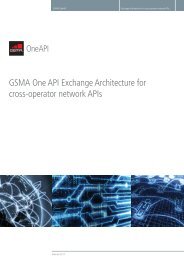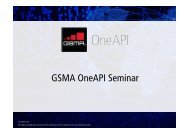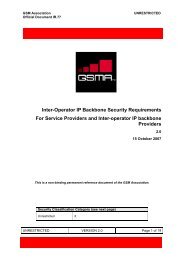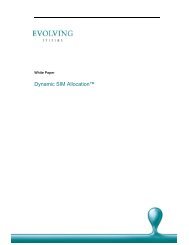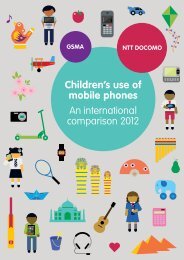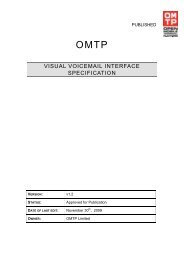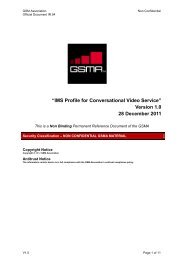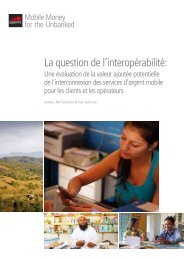Mobile SMS and Data Roaming Explained - GSMA
Mobile SMS and Data Roaming Explained - GSMA
Mobile SMS and Data Roaming Explained - GSMA
You also want an ePaper? Increase the reach of your titles
YUMPU automatically turns print PDFs into web optimized ePapers that Google loves.
What happens when you receive an MMS<br />
while abroad?<br />
• A friend sends an MMS to your mobile phone while you<br />
are roaming. His operator’s network routes the MMS via<br />
international data transit to your home network.<br />
• Your home network sends an <strong>SMS</strong> notification to your<br />
mobile phone abroad.<br />
• Once your mobile phone has acknowledged the <strong>SMS</strong><br />
receipt, the MMS is passed from your home network via<br />
international data transit to your mobile phone.<br />
The visited network operator then uses these details to<br />
calculate the wholesale roaming charge payable by your<br />
home network. The data records, including the applicable<br />
wholesale charges, will be saved in a Transferred Account<br />
Procedure (TAP) file.<br />
TAP files are sent from the visited network to your home<br />
network, typically by using the services of a data clearing<br />
house. A data clearing house acts as a ‘hub’ for the<br />
distribution of TAP files <strong>and</strong> provides the home network with<br />
services such as reporting to assist the home network in<br />
running its roaming business. Your home network then pays<br />
the visited network the appropriate wholesale charges.<br />
What is the difference between pre-paid <strong>and</strong><br />
post-paid roaming?<br />
<strong>Roaming</strong> for pre-paid customers is a more recent<br />
development <strong>and</strong> involves additional investment by<br />
operators. This is because roaming signalling <strong>and</strong> billing<br />
systems are more complex for pre-paid services than they<br />
are for post-paid services.<br />
What happens when you use the mobile<br />
internet abroad?<br />
• When abroad <strong>and</strong> accessing the mobile internet, including<br />
push e-mail, h<strong>and</strong>set internet <strong>and</strong> mobile broadb<strong>and</strong><br />
services, also called Packet Switched <strong>Data</strong> (PSD), your<br />
connection is established by the visited operator’s network<br />
back to your home operator’s network.<br />
• The visited operator’s network passes your internet traffic<br />
via international data transit to <strong>and</strong> from your home<br />
network.<br />
• Your home network connects you to the internet, your<br />
e-mail account(s) <strong>and</strong> other data services.<br />
For post-paid roaming, when the user first switches their<br />
phone on, the visited network checks in real time whether the<br />
home network authenticates the customer <strong>and</strong> authorises its<br />
use abroad. But the data records (CDRs) with the details on<br />
each <strong>SMS</strong> <strong>and</strong> data session are sent to the home operator<br />
with some delay (up to several days).<br />
For pre-paid roaming, in addition to the initial authentication<br />
step, the call-related data must be exchanged in real time<br />
between the visited network <strong>and</strong> the home network by using<br />
a special platform (called CAMEL – Customized Applications<br />
for <strong>Mobile</strong> networks Enhanced Logic), to prevent the<br />
balance of the roaming customer’s account from becoming<br />
overdrawn.<br />
What are wholesale charges <strong>and</strong> how do<br />
operators set them?<br />
Wholesale charges represent the fees the visited network<br />
charges the home network for letting the home network’s<br />
customers roam on its network.<br />
These inter-operator tariffs (IOTs) are agreed bilaterally<br />
between the home <strong>and</strong> visited network operators. Operators<br />
often negotiate competitive incentives, for instance, discounts<br />
relating to the volume of traffic passed between operators or<br />
lower costs for longer sessions.<br />
How do network operators exchange billing<br />
information for roaming customers?<br />
For all data services (<strong>and</strong> voice calls), the visited network<br />
captures the details of every session in a Call Detail Record<br />
(CDR). These record information on the location, sending<br />
party, receiving party, time of connection, session duration<br />
<strong>and</strong> size (measured in KB or MB).<br />
Wholesale charges are paid to the visited network by the<br />
home network, irrespective of whether the home network<br />
recovers any fees from its roaming customers.<br />
5


